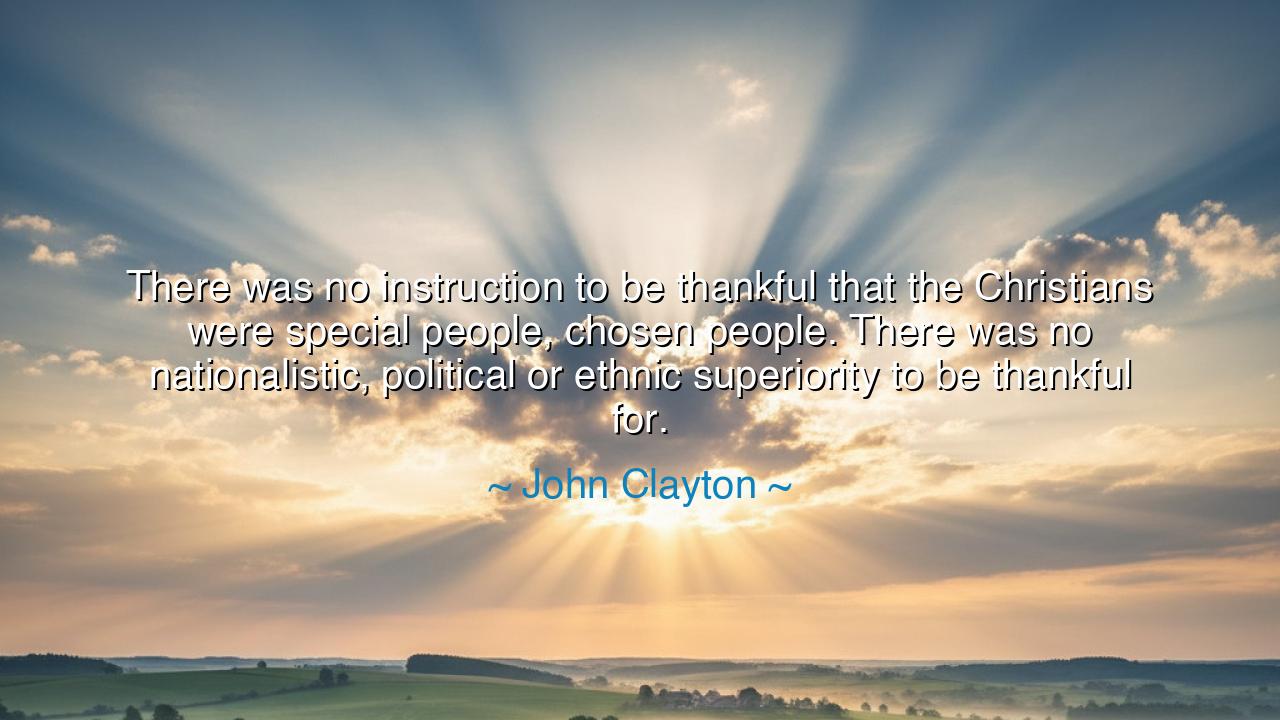
There was no instruction to be thankful that the Christians were
There was no instruction to be thankful that the Christians were special people, chosen people. There was no nationalistic, political or ethnic superiority to be thankful for.






Hear now the words of John Clayton: “There was no instruction to be thankful that the Christians were special people, chosen people. There was no nationalistic, political or ethnic superiority to be thankful for.” These words strike like a bell upon the soul, calling us to remember that gratitude is not for the pride of belonging, nor for the illusion of superiority, but for the mercy and love bestowed upon all humankind. In an age when tribes and nations exalt themselves above others, this teaching speaks with the voice of ancient prophets: humility is greater than dominion, and thankfulness is not for the crown of power but for the gift of grace.
The origin of this truth lies in the earliest gatherings of believers, when Christianity was not an empire but a fellowship of the humble, the broken, the wandering. They were not called to rejoice because they were better, but because they were forgiven. They were not told to claim dominion over nations, but to serve them, to love them, to wash their feet. Clayton reminds us that the core of faith was never about political banners or the swelling of human pride, but about the leveling power of divine love, which places king and beggar alike upon the same ground before heaven.
History bears witness to what happens when this wisdom is forgotten. Recall the Crusades, when men marched under the banner of the cross, not in service of humility, but in conquest and bloodshed. In their zeal they clothed themselves with imagined superiority, believing they were chosen to dominate. Yet the teaching of Christ was not the sword, but the towel with which He washed His disciples’ feet. Clayton’s words are a warning to future generations: whenever faith is entangled with pride, it becomes corruption; whenever gratitude is twisted into nationalism, it becomes poison.
But there are also stories of light, when this truth was upheld. Consider the life of Mother Teresa of Calcutta, who did not count herself superior to the poor she served, nor take pride in belonging to any chosen nation. She bent low to bathe wounds, to lift the dying from the streets, to see in each human face the very image of God. In her humility we see the living answer to Clayton’s words: true gratitude is not in boasting of who we are, but in serving with thankfulness for what has been entrusted to us.
The emotional heart of Clayton’s teaching is this: thankfulness without pride is the purest offering. For pride corrupts gratitude into arrogance, while humility transforms gratitude into love. One who boasts, “I am chosen, I am better, I am above others,” falls into the old snare of Babel. But one who says, “I am thankful for mercy, though I am unworthy,” carries within themselves a wisdom that outlasts kingdoms.
What lesson, then, shall we draw? That every claim of superiority—be it nationalistic, political, or ethnic—is dust before the eternal. Let no man raise his head above his brother in the name of gratitude. Instead, let gratitude be the bond that ties all to all, without walls, without borders. The ancients knew that a city divided against itself cannot stand, and likewise, a faith that exalts some while casting down others is but a hollow shell, doomed to fall.
Practical actions flow from this wisdom. First, examine your gratitude—strip from it any seed of pride. Be thankful not because you are greater, but because you are loved, because you are alive, because you are given breath and time to serve. Second, practice humility: let your gratitude turn outward, not upward alone. Serve those who cannot repay you. Listen to those whom society casts aside. Walk with those who are different, and let your heart see their humanity before their label.
So let it be remembered, children of the future: gratitude is not for superiority, but for mercy. No nation, no tribe, no party, no bloodline holds greater claim to heaven’s light. To be thankful is not to stand above others, but to kneel beside them. Carry this truth into the world, and you will walk the path of wisdom, avoiding the snares of arrogance, and bearing in your heart the fire that unites rather than divides.






AAdministratorAdministrator
Welcome, honored guests. Please leave a comment, we will respond soon